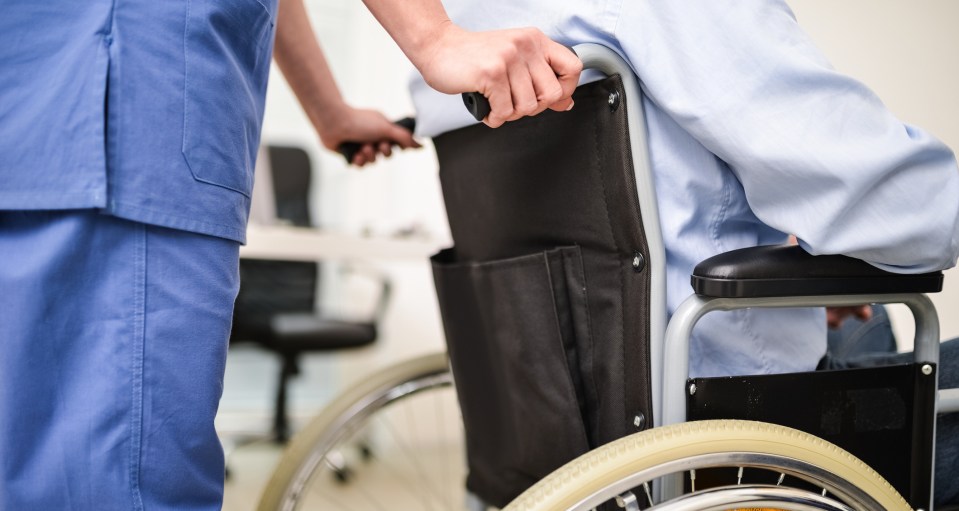A spinal cord injury can dramatically change a person’s life. Caused by damage to the spinal cord or nerves at the end of the spinal canal, complications include limited mobility, difficulty performing everyday tasks like bathing, dressing and grooming, and bowel and bladder dysfunction. “As a result of these significant physical changes, a lot of individuals with a spinal cord injury also face emotional challenges from the sense of loss they experience from their prior lives,” said Lauren Domingue, an occupational therapist and expert on the spinal cord injury task force at Encompass Health Rehabilitation Hospital of Braintree. “Despite the severity of these changes, many individuals with a spinal cord injury are able to continue living fulfilling lives.”
The Importance of the Caregiver
As the caregiver for someone with a spinal cord injury, your life has likely changed a lot, too. From visiting the care setting where your loved one is rehabilitating, to understanding the nature of the injury and providing daily support, caregivers play a key role in their loved one’s recovery. Information is your best friend. “Educate yourself by asking questions of your loved one’s care team about the extent and level of injury and what that means in regard to other medical needs, functional mobility and prognosis to make it easier to understand what your loved one is going through,” Domingue said.
Participate in Family Training After Injury
Caregivers can better help their loved ones by taking advantage of family training overseen by spinal cord injury experts—usually therapists and rehabilitation nurses working at the hospital or other care setting where your loved one is recovering. Topics covered include:
- Learning how to position your loved ones so they are more comfortable
- How to safely transfer from resting to other positions such as sitting and standing
- Bowel and bladder assistance
- Bathing and grooming
If your loved one was in a care setting that didn’t provide family training, or if you need additional support after discharge, Domingue recommends joining a spinal cord injury network, such as the United Spinal Association. “It can offer information and resources on personal care assistants and financial aid,” she said. The organization offers a 24-hour resource hotline at 800.962.9629.
Practice Self-Care
You’re balancing your own needs and commitments with those of your loved one. Your health shouldn’t take a back seat. “The biggest piece of advice is to take care of yourself if you are caring for someone with a spinal cord injury. In order to take care of another person, you have to take of yourself, too,” Domingue said. It’s important to:
- Take breaks. Hire personal care assistants and create a calendar with family members and close friends so you can support your loved one and each other.
- Enjoy your me time. It can be hard to find moments to decompress without others. Consider using a timer to block out time to yourself to read, get outside, go on a walk or for other activities you enjoy.
- Stay physically active. Even short bursts of exercise relieves stress.
- Eat a well-balanced diet by minimizing excess sugar, and instead eat more complex carbohydrates such as whole grains, sweet potatoes and rice. Complex carbohydrates supply your body with energy without a sugar crash. Incorporate protein and a variety of fruits and vegetables into your meals to meet your nutritional needs.
- Seek out counseling for yourself. It’s easy to get caught up in your loved one’s life. Talking with a mental health professional can provide clarity and other coping techniques to help you be your best self.
Alter the Home Environment
Making changes to your loved one’s home environment can improve safety and accessibility making it easier for them to regain independence. Combining therapy with these modifications can provide caregivers with peace of mind and make everyday tasks easier for both of you. Consider the following adaptions:
- Rearrange furniture so there’s space for your loved one to maneuver their wheelchair or walk with a clear pathway. Consider transfers as well by making sure there is enough room to move safely from a wheelchair to furniture or the toilet.
- Ensure the kitchen and living spaces are arranged so commonly used items are within easy reach. For example, place items on the bottom shelf or easy to reach areas of cabinets and countertops.
- Help your loved one stay organized so important items and documents are accessible
- Consider moving outlets, light switches and thermostats to make them easier to reach. Typically installing these 30 to 48 inches above the floor is ideal.
- If your budget allows, consider replacing carpet with durable, slip-resistant vinyl floors and updating floors to be the same throughout the home to eliminate level changes.
- The United Spinal Cord Association has a free product and services directory for other home modifications including widening doors, wheelchair ramps, porch lifts and other more permanent changes to the home. You can search by product/service or by location.

Support Groups
People living with spinal cord injury benefit greatly from support groups. These groups are a welcoming space for those living with spinal cord injury to problem-solve with others experiencing the same challenges and to find community with those who understand what they are going through. Support groups are also available for caregivers and can be a great resource for emotional support, as well as finding different tools that may assist with caring for your loved one. The availability of spinal cord injury support groups varies by location. Ask your case manager for a referral or visit the United Spinal Association’s support group page to find options near you.
Additional Resources for Caregivers
Domingue notes that other resources recommended by spinal cord clinicians at Encompass Health include:
- American Association of People with Disabilities: Advocates for full civil rights for people with disabilities and connects the disability community with friends, businesses and schools
- American Spinal Injury Association: Promotes excellence in patient care and education in the healthcare field
- Disabled American Veterans: Non-profit charged with supporting veterans and their families
- Disability Rights Education and Defense Fund, Inc.: A civil rights law and policy center advocating on behalf of people with disabilities through education, training and legislation development
- New Mobility: A subscription publication in partnership with the United Spinal Association
- National Council on Disability: An independent federal agency dedicated to advising the president, Congress and other federal agencies regarding policies, programs, practices and procedures that affect people with disabilities
- Microsoft Accessibility and Disabilities: Technology products and services designed to help people living with spinal cord injuries and other mobility conditions navigate the digital world
- Job Accommodation Network: Provides free, expert and confidential guidance on job accommodations and disability employment issues
- “The Spinal Cord Injury Handbook: For Patients and Families“: A book co-written by neurorehabilitation specialist Dr. Richard Senelick, who served as the medical director for Encompass Health Rehabilitation Hospital of San Antonio for 30 years. Domingue specifically calls out Chapter 11, which elaborates on the tips above and provides valuable insights for you as you navigate the challenges associated with caring for a loved one with a spinal cord injury.
Spinal Cord Injury Rehabilitation
Learn about our advanced treatments for you or your loved one.
About usThe content of this site is for informational purposes only and should not be taken as professional medical advice. Always seek the advice of your physician or other qualified healthcare provider with any questions you may have regarding any medical conditions or treatments.



